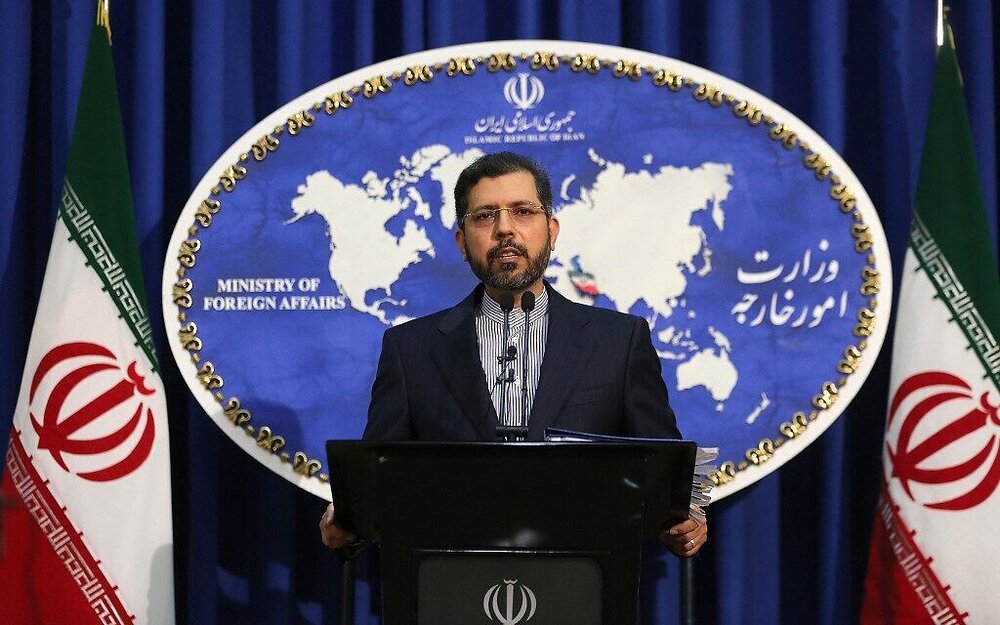Foreign Ministry: Vienna talks have reached a sensitive stage

TEHRAN — The Iranian Foreign Ministry spokesman Saeed Khatibzadeh said on Monday that the Vienna talks have reached a sensitive stage, and the media should distance themselves from portraying unrealistic pictures from Vienna.
Responding to a question by the Tehran Times correspondent about a recent phone call between Iranian Supreme National Security Council secretary Ali Shamkhani and Iranian top negotiator Ali Bagheri Kani, Khatibzadeh said that the details of the conversation must be explained by Shamkhani himself.
“I also talked to Mr. Bagheri this morning. As I said before, the developments in Vienna have reached a difficult point. These are important and key issues and are sensitively pursued by all parties. A number of proposals have been made by Iran, and a number of proposals have been made by the other parties, which, of course, is a natural part of the negotiations,” he told a regular news briefing.
The diplomat went on to say that some media outlets try to portray a rosy picture of the Vienna talks, while some want to say that the talks are at an impasse.
“Negotiations are complex and difficult, and has reached key points. Disputes are at stake and require serious and key decisions from Washington,” he noted.
The spokesman then went on to say that as long as both sides do not agree on all four areas (verification, guarantees, technical nuclear issues, and sanctions removal), it cannot be said that progress have been made.
“These issues are inter-connected,” he added. Khatibzadeh went on to say that there are several key nuclear issues.
“Protecting the achievements of our young nuclear scientists is our ‘red line’ and we cannot ignore these achievements and efforts. In the matter of lifting sanctions, all sanctions in violation of the Joint Comprehensive Plan of Action (JCPOA) must be lifted. Some issues have been remained in this area that require political decisions by the other side,” he reiterated.
The diplomat further said that progress has been made in the field of verification.
“Ideas in this field have become words. Words have become an executive process, and some decisions are still remained in this area. In the field of guarantees, this issue is divided into different sections. Talks have been held in this regard. There are still unresolved topics in this area, and as I said, they all move in an interconnected space,” he stressed.
He then went on to say that those who follow developments in the Vienna talks seriously know that the delegations consult with each other on a daily basis.
He added that these conversations may even take place several times a day, and this is normal and creating hysteria on normal events in media is not helpful.
“The delegations meet and consult. They may return to their capitals for a break and resume negotiations, and this is normal in negotiations process, and I call on the media to distance themselves from such atmosphere. Some want to be overly optimistic and some want to be pessimistic and present a negative image. None of this is the real scene of the Vienna talks today, and as I said before, the real scene of the Vienna talks is that talks are taking place on sensitive and key issues,” the spokesman remarked.
Khatibzadeh added that all sanctions against the Iranian people must be lifted in accordance with the JCPOA, and it does not matter what the label of the sanctions is.
“Sanctions contrary to the JCPOA and UN Security Council Resolution 2231 must all be lifted altogether,” he stressed.
Regarding the date of a possible agreement, the diplomat said that if the European and American sides respond to Iran's initiatives within the framework of the JCPOA “today”, and if they respect the rights of the Iranian people and the logic that Iran has put on the table today, there is no need for the end of February and an agreement in Vienna can be announced the next day if these conditions are met.
He added that the time to reach an agreement has a direct relationship with the real will of the United States and the West.
“If they show real will and move in this direction, the time to reach an agreement will be less, and this agreement will wait for political decisions to be made by the other parties,” he reiterated.
The Foreign Ministry spokesman added there is “no impasse” in the Vienna talks.
“Negotiations are being held as before, and talks and round trips are taking place between the delegations,” he noted.
Khatibzadeh continued, “Dialogues become difficult in the days when serious issues need to be discussed, and there are definitely a number of delays and points that the parties must decide on.”
He then went on to say that after the Iranian delegation returned Vienna last week, Iran re-discussed the draft proposal with the P4+1.
The P4+1 refers to the four remaining permanent members of the UN Security Council and Germany which are still party to the nuclear agreement.
“Giving and receiving offers is common, and it is not uncommon for a proposal to be made and received,” he noted.
The diplomat then outlined that Iran has made its political decision many years ago when it decided to remain in the JCPOA.
“We are waiting to receive a response from the West to the Iranian initiatives,” he concluded.

Leave a Comment